| Salary and Market Trends Survey
Our eighth APM Salary and Market Trends Survey, a groundbreaking piece of research that provides a detailed overview of the project profession.
Since its launch in 2015, our APM Salary and Market Trends Survey has received over 30,000 responses from across the profession. This has allowed us to paint a clear picture of the employment landscape, offering a comprehensive overview of salaries and working life, as well as the latest trends and key issues that’ll have the biggest impact on project management.
The survey was conducted by global research company YouGov, which delivers robust and insightful market research across a wide range of sectors. For the 2023 research, YouGov undertook a quantitative online survey of 2,806 project professionals between 7 November and 6 December 2022.
This report contains a wide range of talking points, from how the economy has affected the profession to the best ways to attract and retain talent. Along with diversity and inclusivity, and gender equality, these are all key points for debate and we invite all readers to add their opinions and reactions to the survey on our LinkedIn and Twitter channels using #APMsalarysurvey.
The respondents were a broad mix of people from all areas of the project management profession and included both APM members and non-members.
| Project management salary
Financial reward is just one of the many important benefits of a career in project management. Project professionals enjoy a salary comfortably above the UK average (£38,6001 ) and rank above the finance and insurance, energy supply, and IT industries1 .
However, the average salary for project professionals has remained at £47,500 since 2020, with high inflation and with the increase of the cost of living driving real-terms pay packets lower. But the positives for the profession include many sectors providing average salaries way above that national level, with salaries remaining equally attractive all over the country and not centred on London and the South-East.
It’s no surprise that project management continues to attract new talent and offer lifelong fulfilment for all those who work within it. This is due to strong career progression, a wide variety of projects, and the embracement of new technology in all areas of the project profession.
1 Office for National Statistics (ONS), 2020 2 Based on a sample of 23 respondents
Please try our salary calculator.
Do note that the mean is used for the average salaries in the calculator.
| Average project manager salary in the UK
For the fifth year in a row, the average project manager salary stands firm at £47,500. Given that the cost of living has risen dramatically in the past two years, it could be argued that the average project manager salary is decreasing in real-terms value, and to attract and retain the best talent, salaries need to rise.
While London and outside the UK currently offer the highest project management salaries, the number of project professionals based in the South-East earning over £70,000 has risen to equal those in the capital.
The stable average salary combined with 65% seeing a pay increase in 2022 indicates the attractiveness of project management as a good career choice, with the percentage of high earners (£70,000+) increasing from 20% to 22%, along with the average salary for apprentice and trainees (up by 11%).
Working arrangements also appeared to have shifted slightly, with the average project manager UK salary for freelancers, consultants and the self-employed decreasing from £72,500 in 2021 to £62,500, while those in permanent employment and on temporary contract have seen their salaries rise by 5%.
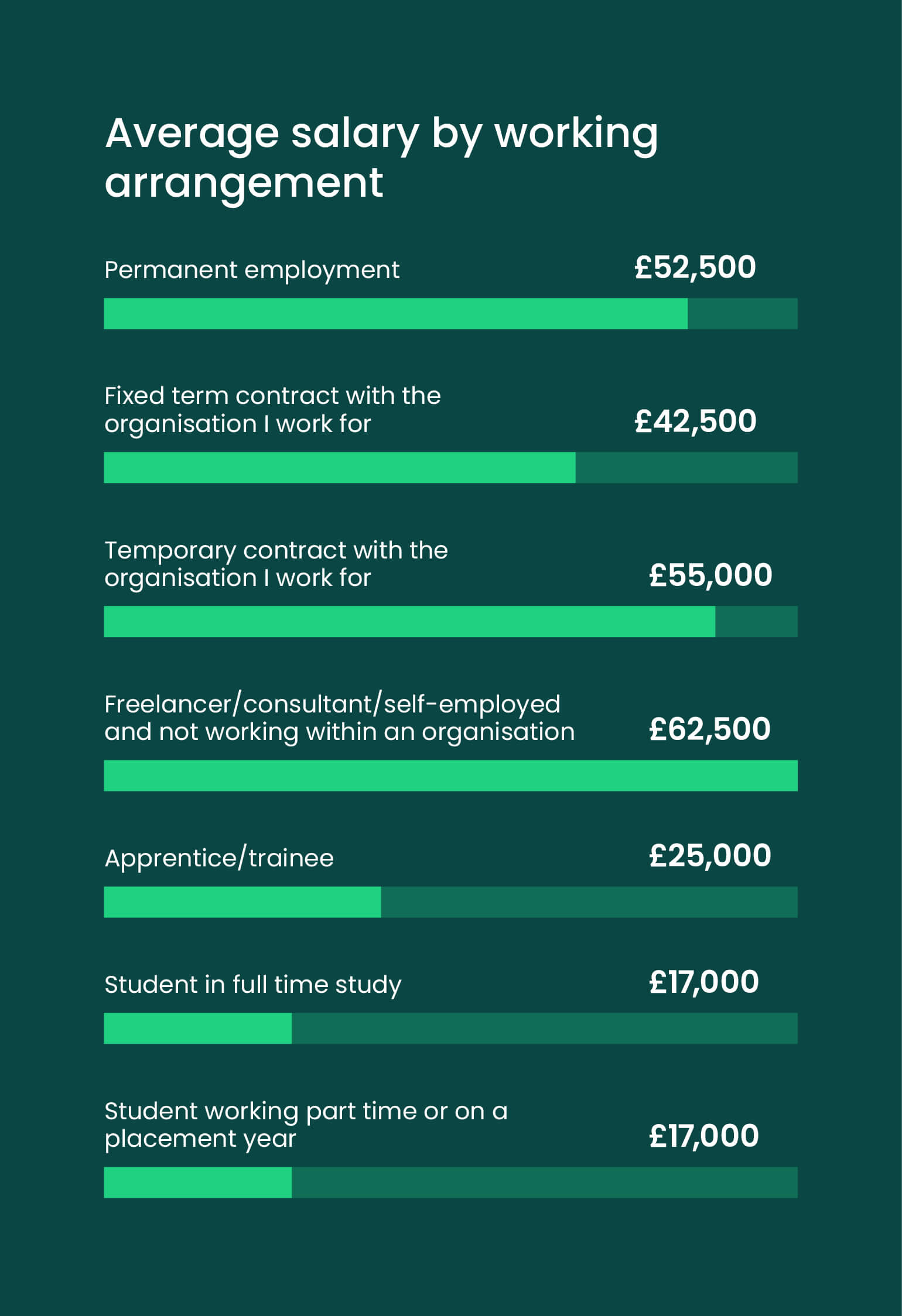
| Impact of APM membership on salary
With an average salary of £47,500 for 2023, Full APM members (MAPM) earn an average of £67,500 – 42% above the standard – while the average salary of Fellow members is £72,500. For those in the earlier stages of their careers, Student members earn an average of £27,500, and Associate members £42,500.
The 2022 APM Membership Satisfaction Survey found that 45% of APM members felt that membership has a positive impact on salary, as did 48% of Chartered Project Professionals (ChPP). Obviously, there are many factors that impact salary, but being an APM member brings with it professional recognition, knowledge and resources that can help with all areas of the project management profession.
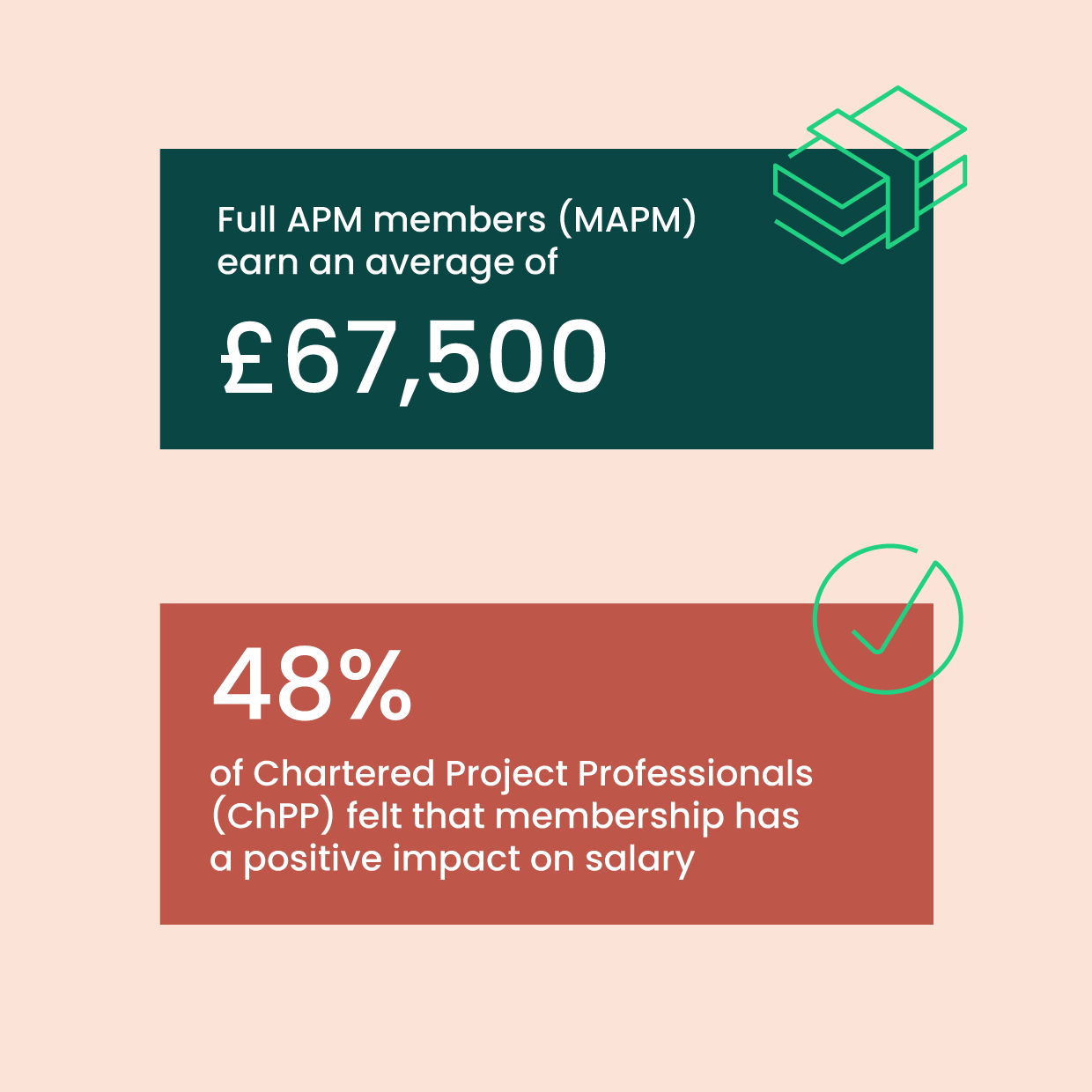
| Salary by role
Despite the challenges facing the project management industry, salaries for the more prevalent roles have either risen or remained the same. Project managers have enjoyed a salary increase from £42,500 to £47,500 while project management consultants have seen their salary boosted from £57,500 to £62,500. Project coordinators and senior project managers have also received larger pay packets, with an 18% and 9% increase.
There were a few salary drops, namely business or systems analyst (£40,000 to £37,500) and project planner (£47,500 to £42,500), but more common roles such as assistant project manager, head of projects/programmes and programme manager remained the same.
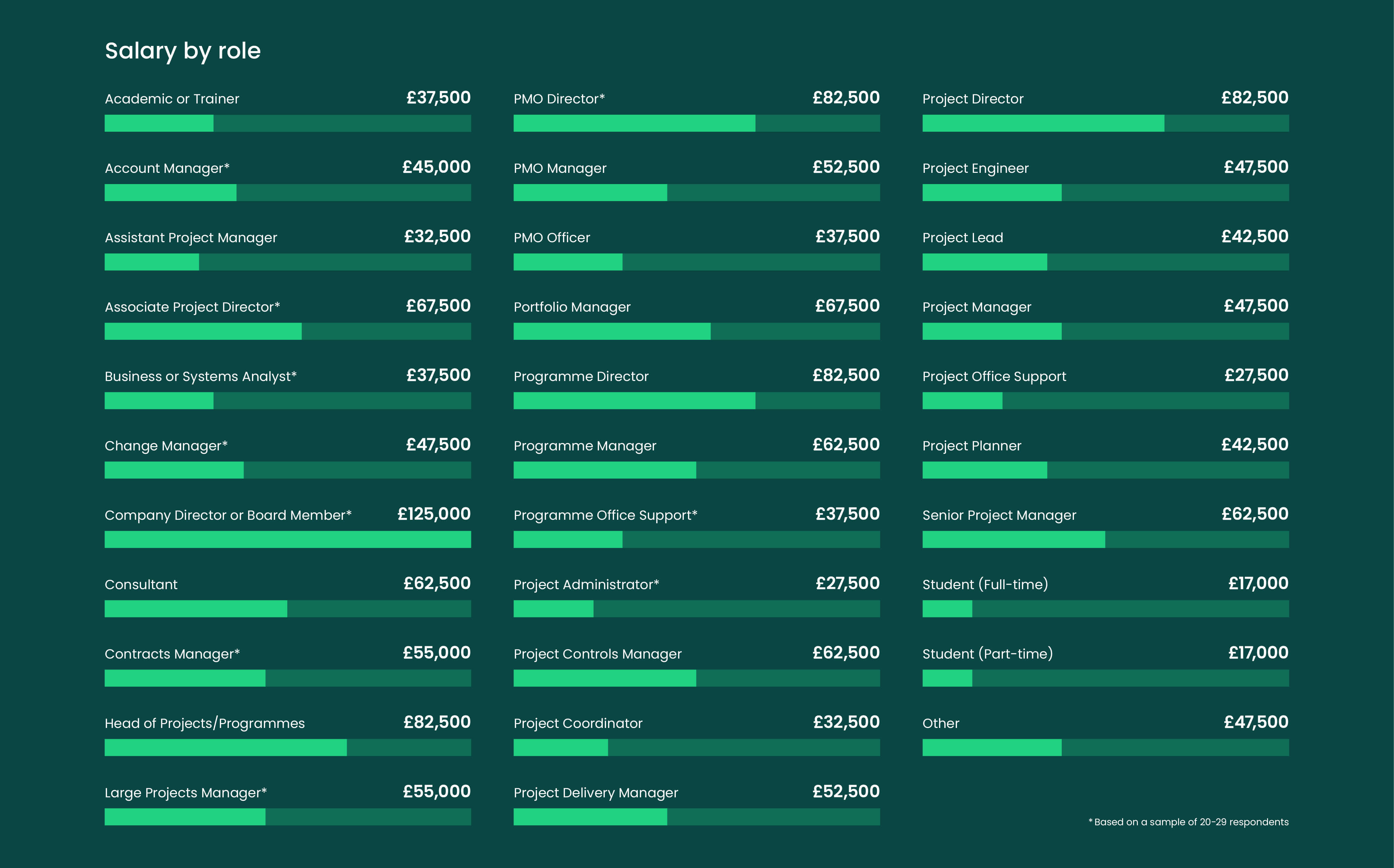
| Project manager salary by UK regions
Project management salary remains strong across UK, with the East of England, Northern Ireland, South West of England, and Yorkshire and the Humber all increasing their average salaries by £5,000. The only areas that decreased were the East Midlands, which reduced from £52,500 to £47,500, and the North East, which reduced from £47,500 to £42,500.
In London and the South East, the average salaries stayed at the same levels as 2021, along with Wales, the North East and Scotland. However, while Wales and the North East showed a marked decrease in the numbers of project professionals earning £70,000+, the South East increased its number of high earners to the same level as London.
Outside the UK, there’s been a significant decrease in project management salary growth rate, dropping 22% from £67,500 to £52,500. After three years of strong growth, the pay of the top overseas earners (£70,000+) has also decreased from 43% to 35%.
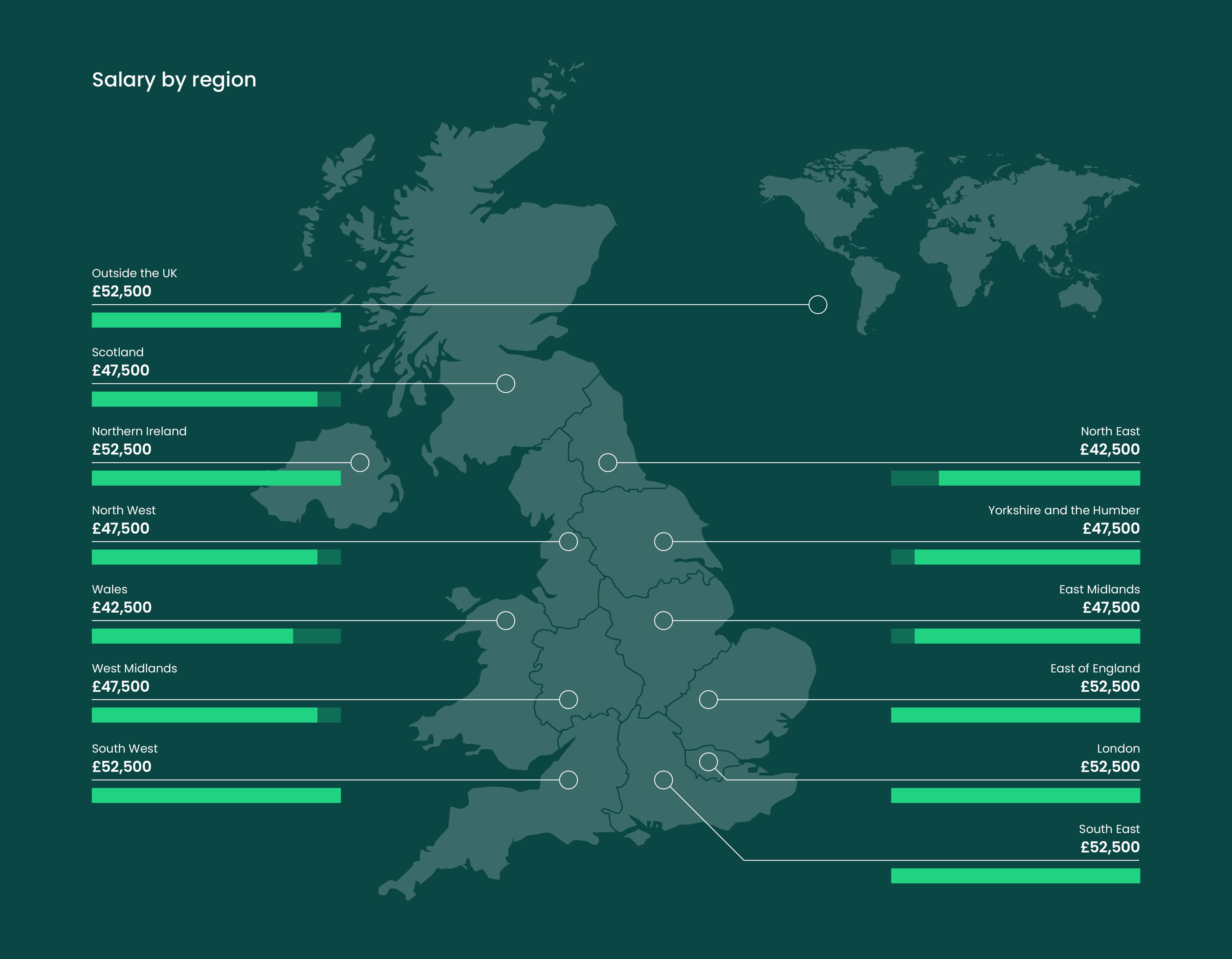
| Salary by age
After two years of largely static pay, project management salaries are showing signs of increasing, with all age groups over 35 enjoying a boost to their pay packet. Of those groups, the 35-44 year-olds experienced a 10% increase, 45-54 year-olds had 9%, and 55-64 year-olds had 8%.
At the younger end of the scale, the average salary for 18-24 year-olds has remained at the same level since 2021 at £27,500. Compared to the current average graduate salary in the UK of £24,0003 this clearly demonstrates the financial appeal of the project management profession. However, those at the next stage of their careers (25-34) have seen a 12% drop in salary, going from £42,500 to £37,500.
3 Graduate Outcomes report, HESA (Higher Education Statistics Agency), 2022
| Salary by gender
Since the average project management salaries for men and women haven’t changed since 2021, the gender pay gap within project management remains at 24%. Furthermore, looking at the proportion of women earning between £50,000 and £69,999, this has dropped back down to 20% following an increase to 24% in 2021. There’s clearly more that the project profession needs to do to close the gap on the disparity in pay between the sexes, as the UK gender pay gap in April 2022 was 8.3%4.
However, when you start to look at the detail of gender within certain jobs, a more encouraging picture starts to emerge. Traditionally, senior positions such as consultant and project director have been dominated by men, but this year, the amount of women in those roles has been increasing. Almost a third of consultants and project directors are now female, while the number of head of projects/programmes and senior project managers that are female is also on the rise in the project management job market.
This small shift towards equality in senior positions is matched by a similar increase in men holding more junior roles, such as programme office support and project coordinator. While women still dominate the project administrator role, holding 79% of the positions5, this indicates positive signs of equality in junior roles.
4 Office for National Statistics: Annual Survey for Hours and Earnings (ASHE), April 2022
5 Based on a sample of 24 respondents
🕮 Levelling the playing field: women’s views on achieving success in the project profession
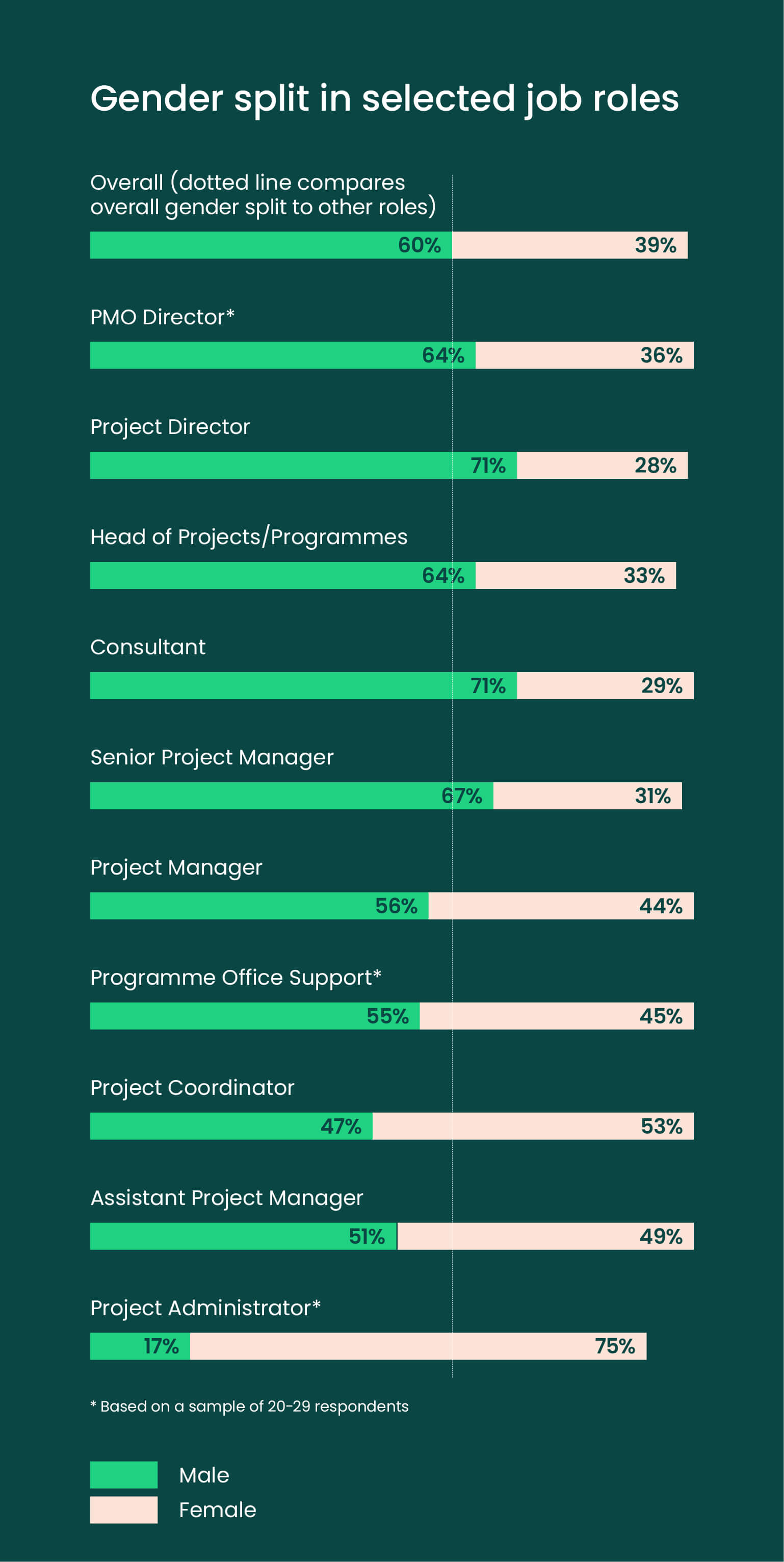
| Salary by sector
Looking at specific roles, there’s a greater proportion of salaries that are increasing rather than decreasing, with almost double the amount of sectors seeing their average salary rise. While energy and utilities remains at the top of the highest average salary list, it’s now joined by financial services and life sciences – two areas that have seen significant investment over the past two years. Life sciences shows a particularly strong salary increase, going from £47,500 to £62,5006 .
Other sectors that have enjoyed salary rises include aerospace, construction, defence, telecoms, IT, and transport and logistics, which rose by 11%.
There were a number of sectors that experienced a reduction in average project management salary, most notably business and professional services, and retail, which both dropped by 20%. The retail sector in particular is currently suffering with the challenges of the economy and the energy crisis.
6 Based on a sample of 23 respondents
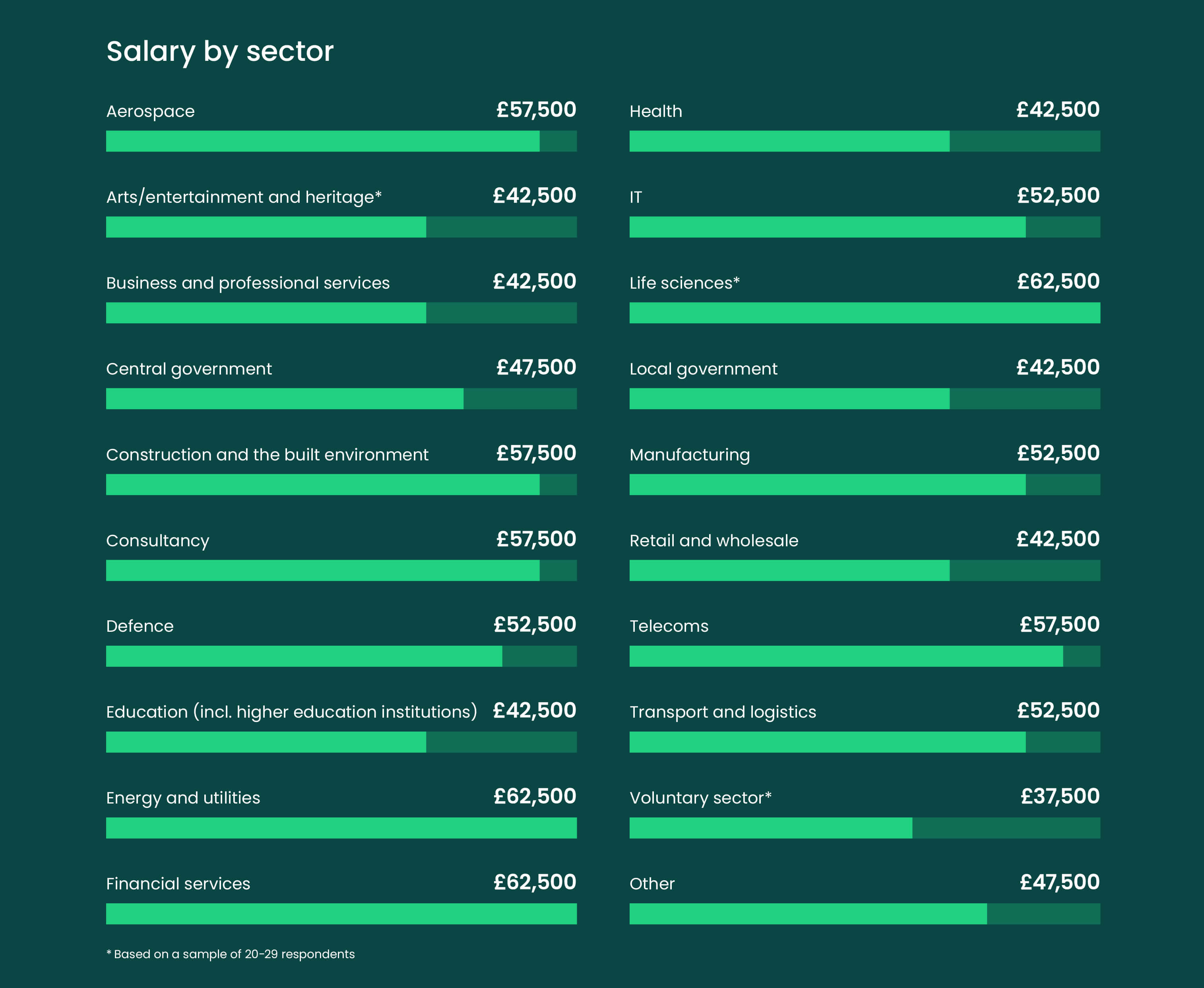
| In summary: A year of resilience and growth
An attractive salary is one of the key drivers for recruitment and retention in project management, and this year those salaries are showing clear signs of increase. While the average project manager salary across the industry remains at the same level as the previous five years, our project manager salary trends for 2023 reveal that a number of roles, regions and sectors boast above-average increases.
The reasons for this are varied. Like all industries, project management is going through a skills shortage, with companies keen to invest and grow but needing skilled people to do it. In addition, many projects that were postponed during the pandemic are now back up and running, driving up salaries for in-demand roles. The average salary increase for apprentice and trainees is also a healthy sign that companies are seeing the value of this route into the profession.
Another encouraging finding is the increasing number of women in senior positions, along with a better gender balance in more junior roles. While the gender pay gap hasn’t changed this year, this interesting development is a sign that the size of the gap could be on its way down.
For us at APM, the fact that Full members earn an average of £20,000 more than the profession average is tangible proof of the value of APM membership. And while we understand that salary is just one aspect of a fulfilling career in project management, it gives us all a welcome boost.

